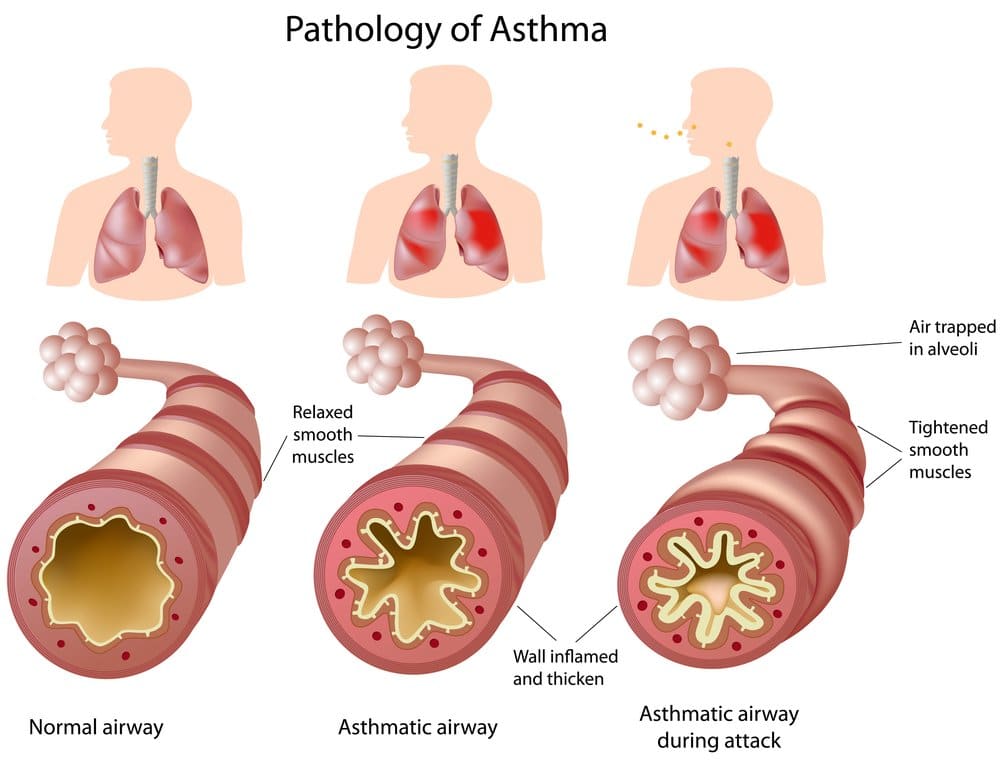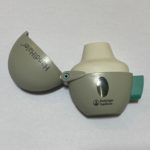Asthma is a chronic condition that affects your airways. Your airways are the small tubes that carry air in and out of the lungs. Asthma causes breathing problems and makes it difficult to breathe. When you have asthma, you may experience periods when air passage to your lungs get narrower and makes it difficult to breathe. This may be because you have come in contact with your asthma triggers. The picture below shows how the airways become narrow in asthma and even narrower in an asthma attack.

Signs and symptoms of asthma
Asthma symptoms differ from one person to person and from one period to another. These symptoms can sometimes get temporarily very bad. This is referred to as having an asthma attack. Signs and symptoms of asthma include:
- Wheezing. This is a noise that sounds like whistling when you breathe out.
- Shortness of breath
- Chest tightness
- Coughing

Risk factors of asthma
Some factors may increase your chances of developing asthma. These factors include you;
- have a blood relative, for example, a parent, brother or sister who suffers from asthma.
- suffer from other allergic conditions like atopic dermatitis (eczema) or allergic rhinitis (hay fever).
- are a smoker or being constantly exposed to second-hand smoke.
- are overweight
- are constantly exposed to pollution and triggers such as chemicals.
With a better understanding of your asthma and by working together with your asthma healthcare team, you are more likely to manage it which means your asthma will cause minimal disruption to your everyday life. We advise that you develop an asthma action plan with your healthcare provider to help manage your asthma.
It is important that you get yourself checked if you get symptoms of asthma so that you can get diagnosed. It’s very important to get a confirmed diagnosis so that you can get treatment as soon as possible because an asthma that is untreated or under-treated can lead to worsening symptoms and life-threatening asthma.
If you are diagnosed with asthma, your doctor may prescribe you with some medicines or/and inhalers. It is important that you take your asthma preventer medicines as prescribed by your doctor so that your airways are less inflamed and less sensitive, making you less likely to get asthma symptoms.
You will know your asthma is well controlled when:
- you don’t get daytime symptoms
- your asthma is not stopping you from your normal daily activities
- you don’t have any asthma attacks
- your asthma does not wake you up at night
- you don’t need to use your reliever inhaler
Remember to take your reliever inhaler if your symptoms get worse or if you are having an asthma attack.
It can take a while to find the best treatment for you, so it is advised that you attend all your doctors’ appointments and reviews and have an asthma action plan in place. You will usually have a review some weeks after your usual dose or medicines/inhaler is changed. This is just to check that your medicines are working as expected and that they are the right medicines for you.
Your doctor may need to increase the dose of the medication you are currently on. However, the doctor will first need to know that you are currently taking medication correctly for example that you have the right inhaler technique, how regularly you’re using your preventer medicine and any triggers you might be exposed to. This is because with the right support from healthcare staff, a good inhaler technique, a good routine that helps taking your asthma drug and by avoiding your asthma triggers, you may not require an increase in dose.
About the author
Nwasom is a pharmacy graduate and a pharmacist currently practising in the United Kingdom. I have great experience communicating with patients and their family as gained through working as a pharmacist in both the hospital and community pharmacy sector. I love writing so it was a natural thing to try and pass medical and health information on through writing.




